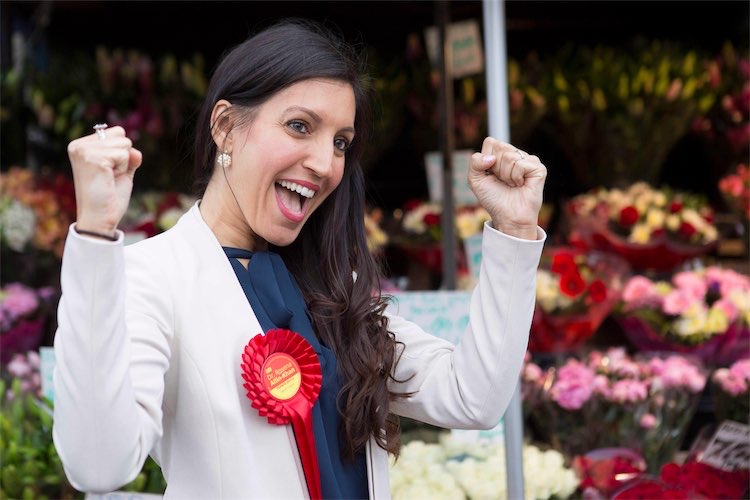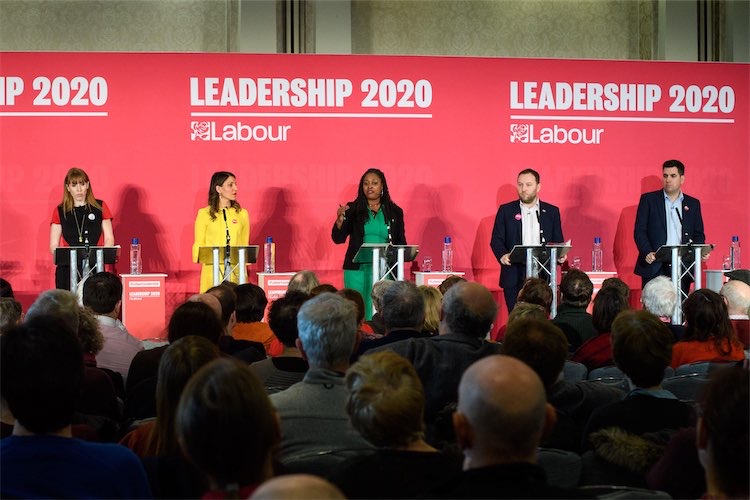The Rosena Allin-Khan Interview: "There is a mental health crisis and it’s only going to get worse"
Dr Rosena Allin-Khan became shadow mental health minister during the first Covid-19 lockdown in April 2020 (Photography by Baldo Sciacca)
12 min read
From being a talented musician to fighting to save children from the horrors of genocide, Dr Rosena Allin-Khan has led many lives. Now shadow mental health minister, she talks to Zoe Crowther about her latest mission: to end the crisis facing mental health services in the NHS. Photography by Baldo Sciacca
As a Cambridge-educated doctor, dedicated sportswoman, and Labour front bencher, Dr Rosena Allin-Khan stands out from the crowd – quite literally, wearing a statement red blazer on the day of our interview. But when we sit down to talk, it quickly becomes clear that some of her most harrowing life experiences are what truly set her apart from many others in Westminster.
Brought up in a working-class home in Tooting, south London, Allin-Khan’s Pakistani father and Polish mother were both musicians, and after they separated, her mother raised her and her brother as a single parent, working three jobs to make ends meet.
Allin-Khan did not let her disadvantaged start in life hold her back from pursuing a wide range of interests. She lists them with zeal: she achieved high grades in violin and piano, dabbled in saxophone, loved to sing, and was an aspiring egyptologist and astro- and quantum-physics enthusiast.
She was even offered a record contract while singing in a band before going to medical school, and is currently “spending some time” in a friend’s recording studio, but confirms she will not, sadly, be releasing a single to launch Labour’s general election campaign.
“There’s no time for a music career for Rosena now, we’ve got a general election to win!” she jokes. “Music, the arts, and sport, that is how I decompress.” Now, at 45, she practises martial arts and boxing and occasionally trains with the women’s parliamentary football team.
Despite her many interests, Allin-Khan always knew her destiny. “It was like when I came out of the womb, I wanted to be a doctor,” she says. “All I ever wanted to do is be a doctor. A psychic friend told me that I had a past life as a nurse in the war in Poland.”
 Rosena Allin-Khan is clear she always wanted to be a doctor (Photography by Baldo Sciacca)
Rosena Allin-Khan is clear she always wanted to be a doctor (Photography by Baldo Sciacca)
At the age of three, Allin-Khan found out that her grandmother in Pakistan was blind. “I wanted to become a doctor to make her better,” she says. “And that never left me. Somehow, there was this sense of, if I didn’t become one, I wouldn’t feel truly happy.”
This might explain why, while being one of Labour’s star players, an MP for her local area, and a mother-of-two, Allin-Khan still makes time to do regular shifts as an A&E doctor at St George’s Hospital, Tooting.
After qualifying, she studied for a Master’s degree in public health, then worked as a humanitarian aid doctor in conflict zones across the Middle East, Africa, and Asia. She has visited the Rohingya refugee camps twice, and describes how she treated patients in the most dire of circumstances; stories she still finds difficult to talk about after giving moving speeches to Parliament detailing her experience.
“You were seeing pregnant women beside themselves, crying and screaming, other mothers whose babies had been thrown onto burning fire. Carrying a toddler and pregnant with another, talking about the unenviable choice between trying to save a child that’s burning, versus running away with the one that you’re holding.”
Her eyes brimming with emotion, she adds: “For me, there was guilt and trauma of coming home knowing that I’m able to put my little girls to bed.”
Sitting opposite her as she sips a tea with two sugars, it is difficult to imagine how someone could have seen something so harrowing and yet still be so buoyant with enthusiasm for her job.
“As a junior doctor I experienced sexual harassment and it made me fearful to go into work”
Her primary focus now, in her role as shadow mental health minister, is how to tackle the manifold pressures facing the United Kingdom’s mental health services.
Despite saying she went into politics “by accident”, Allin-Khan has a deliberate determination to improve mental health care. The Tooting MP argues that the topic of mental health has become “too politicised” and wants there to be greater cross-party consensus on the need to prioritise it: “It’s not about who gets the policy, it’s that we just need the investment.”
But there is one Labour policy she is particularly keen to emphasise, which is a pledge to dramatically cut mental health service waiting lists, guaranteeing that patients receive appropriate treatment within a month – not just an initial assessment.
Research by the Royal College of Psychiatrists last October found that 43 per cent of adults with mental illnesses said long waiting times had worsened their mental health. Twenty-three per cent had to wait more than 12 weeks to start treatment, and many patients turn to A&E to seek help – where there is already an acute shortage of beds.
An investigation in this issue of The House has found average community CAMHS waiting lists in February have rocketed by two-thirds in two years in England, meaning children are waiting on average 21 weeks for a first appointment.
"This is what always happens to mental health, it just gets absorbed in something else"
With waiting lists across the NHS at a record high, would it be unrealistic to suggest there are going to be month-long waits for appropriate treatment any time soon?
“Yeah, so you’re absolutely spot on,” Allin-Khan says. “In fact, I would respectfully challenge some of those stats and say that they’re even longer. Some people waiting for autism and ADHD support are looking at 600 or 700 days sometimes.
“It’s a bold pledge that is deliverable by virtue of the fact that we understand it will take time.” Labour still hopes, however, to deliver this within its first parliamentary term.
As part of the plan to deliver this promise, Labour wants to recruit 8,500 new mental health staff within its first term in Parliament, funded by closing a carried interest tax loophole and by levying VAT on private schools.
“So it is not a quick fix,” the Labour shadow minister insists. “We need to recruit new staff, but we also need to value and retain the ones that we’ve got. They’re leaving in droves, they are just absolutely at breaking point.”
 Labour have pledged to cut mental health waiting lists down to a month (Photography by Baldo Sciacca)
Labour have pledged to cut mental health waiting lists down to a month (Photography by Baldo Sciacca)
If she gets into government, Allin-Khan says she would work with other departments, including education and justice, to tackle root causes in mental health issues and mental health inequalities.
In opposition, she sits on the joint committee for the draft Mental Health Bill, which seeks to reform the 1983 Mental Health Act and give greater choice and support to patients. The committee is waiting to hear back from the government on its recommendations.
Allin-Khan says going through the bill has been “really eye-opening”: “It has actually epitomised good cross-party working. It’s really clear from all the peers and MPs from all parties that were there how much needs to change, but also it was quite sad to hear from all the experts and people with real lived experiences which the government doesn’t listen to.
“There’s a sense that it’s going to take so long to deliver. It’s very difficult to find anyone that believes this can be dealt with quickly. Without dedicated strategies with a pure mental health focus, it’ll be difficult to deliver what’s needed in the timeframe that’s going to help people who need it the most.”
One of the key themes of the draft bill is racial disparities in mental health treatment, an issue which Allin-Khan also thinks will take “time” to address: “The long-term view is about flushing out systemic racism that causes black and minority ethnic groups to disproportionately struggle with mental health. That is going to take a generational shift.”
In the shorter term, she says different communities need to be able to see themselves represented in their carers. Does Labour have any plans for recruiting underrepresented demographics in the NHS specifically? “That’s what we’re currently working on.”
In January, the government shelved its 10-year cross-party mental health strategy, with mental health conditions now to be included in a “Major Conditions Strategy” – to much outrage from mental health charities.
“That’s just not good enough,” Allin-Khan sighs. “This is what always happens to mental health, it just gets absorbed in something else. We need a dedicated approach, there is a mental health crisis and it’s only going to get worse. The government is burying their heads in the sand.”
 Rosena Allin-Khan became the MP for Tooting in 2016 when Sadiq Khan resigned his parliamentary seat to become the Mayor of London (Alamy)
Rosena Allin-Khan became the MP for Tooting in 2016 when Sadiq Khan resigned his parliamentary seat to become the Mayor of London (Alamy)
Labour has also pledged open-access mental health hubs for young people in every community and specialist mental health support in every school. She believes these hubs will help to tackle the ever-increasing pressures on young people, which she worries will also affect her own children, aged eight and nine.
“The pressures on children are huge. My own children are both at primary school but already there is a sense that your value as a child is based on your exam results,” she says, adding that she limits her own screen time in front of her kids so they can feel she is “present”.
She also encourages them to share one “worry” from their day before going to sleep, followed by three things they felt have gone well: an approach she has formed from meeting “incredible people with incredible tips” during her last three years as shadow mental health minister.
“We need to recruit new staff, but we also need to value and retain the ones that we’ve got”
Mental health touches people across the generations in Allin-Khan’s family. Her dad suffered from dementia before he died in 2020; the same rare form of the disease that actor Bruce Willis has been diagnosed with this year.
“We went through a very difficult, painful journey, my brother and I, on that journey with him,” Allin-Khan says. “Dementia puts a huge mental health strain on family members, they face difficult challenges on how to manage young families and older parents at the same time.”
After a pause, she returns to Labour’s plan to deliver mental health treatment within a month, saying that she believes it would “capture the different demographic groups”, including the elderly.
Allin-Khan wants to be optimistic about the future of the NHS and she speaks fondly of colleagues she has met in healthcare. However she also recognises the sector has an unpleasant side. On the day of our interview a review found cases of bullying and a toxic work environment at one of England’s largest NHS trusts, University Hospitals Birmingham. Whistleblowers said the extent of bullying by senior staff put patients at risk.
Has Allin-Khan ever experienced that kind of behaviour in her 18 years as a doctor? “Yeah,” she replies, before the question has even finished. “As a junior doctor I experienced sexual harassment and it made me fearful to go into work,” she says, explaining that a senior colleague threatened her career. “I was once shut in a room and humiliated and told that my career would be affected if I didn’t go along… It feels as though your world is going to implode. It did feel as though the consultant could affect your career, but I know that lots has been put in place since then.”
But working conditions in the NHS are still a hot topic, with thousands of healthcare workers, including nurses, junior doctors, and ambulance staff, taking part in strikes over the last few months over pay and staff retention.
The Labour Party has told its frontbench MPs they cannot join picket lines, with leader Keir Starmer stressing that as a potential government-in-waiting, rather than stoking disputes, it needs to aim to solve them through negotiation.
 Rosena Allin-Khan unsuccessfully ran for the Labour deputy leadership in 2020 (Alamy)
Rosena Allin-Khan unsuccessfully ran for the Labour deputy leadership in 2020 (Alamy)
When asked whether she would strike if she was working full-time as a junior doctor, Allin-Khan says she “probably would”. Describing herself as standing with striking doctors and nurses “in spirit”, she says she believes her fight now is in Parliament.
“You don’t strike easily or willingly, you do so because you feel there is no other choice. Negotiations break down, people can’t feed their families. Ultimately, I’m not going to tell someone they’re doing the wrong thing by striking, that’s their choice.”
Allin-Khan certainly uses the language of someone gearing up for government, despite saying she just goes “from one day to the next”.
“But if I was to stop and think about it, the overwhelming feeling I would have about getting into government would be that it would feel just incredible to be able to implement the policies that we’ve come up with in mental health,” she says. “It’s not about being a minister.”
In the run-up to the next general election, Allin-Khan says it will be a fight “every day”, with “no complacency and no guarantees”. The A&E doctor ran in Labour’s deputy leadership contest in 2020, coming a close second to Angela Rayner. So does she see herself eventually running to be party leader? “Oh, God, no!”
